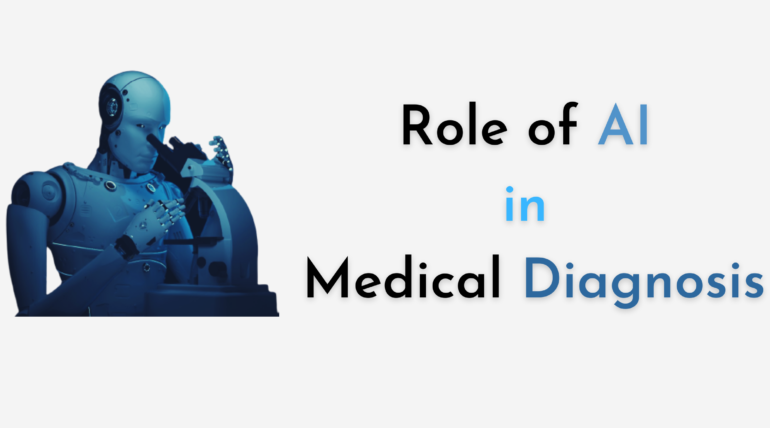
Disease diagnosis is important for the right treatment and patient health. Human error hinders diagnostics accuracy, as the interpretation of the medical images is a complicated and challenging task. Artificial intelligence (AI) can help enhance the accuracy and efficiency of diagnostics in this situation. Simply said, all diagnostic data will be gathered and used to better understand diseases so that they can be treated more effectively.
How is AI used in healthcare?
AI offers a huge number of benefits than traditional techniques. So, let’s have a look at some of the points:
1. Artificial Intelligence help in alleviating physician burnout
AI can play a pivotal role in medical diagnosis. When working through massive quantities of information and imaging, artificial intelligence can not only reduce the pressure on the physicians but can manage a large percentage of the administrative burden as well. Furthermore, AI provides medical practitioners with the essential support, and the right solutions while managing a large amount of data.
2. Decision making
Diagnostics and treatment have always been difficult processes since doctors must consider the patient’s symptoms, all available treatment options, potential research mistakes, possible side effects, diseases with symptoms that are extremely similar, and many other factors.
AI-based solutions assist clinicians in overcoming research challenges, processing large amounts of health data more quickly, and ensuring a clear overview of a patient’s health. AI software platforms are used in a variety of healthcare settings, with the goal of using AI algorithms and software to support clinical decision-making in areas such as patient monitoring, medical diagnostics, and so on. These algorithms employ predictive analysis to filter, search, and organize trends in large data sets from numerous sources, as well as providing probability analysis to healthcare providers to make quick and informed decisions.
3. Virtual health assistants
It is the other important benefit, essential for both the doctors and the patients. It can analyze data and make medical recommendations to patients. Additionally help patients by sending their health status to their doctors, helping them in diets, and sending them reminders about medicines. It can even connect patients directly to doctors for advice, thus reducing the cost of visiting a clinic or a hospital.
4. AI helps save time
Disease diagnoses could sometimes be trickier tasks. The traditional methods are manual and error-prone. Usage of Artificial Intelligence (AI) predictive techniques has resulted in more efficient treatment, reduced errors, and also which is less time-consuming. Additionally, AI can provide the test results of CT scans, MRIs, and ultrasounds, etc., reducing the time taken to conduct the test and providing quicker results. This helps the patients from waiting weeks to get a test result, which they can get done within a few hours.
5. Early Detection and Classification of diseases
Implementing AI in medical diagnosis offers countless benefits to the growth of the health care industry. AI-enabled software helps in the early detection of certain diseases even before evident symptoms appear. It can accurately detect the signs of a certain disease in medical images such as x-rays, MRIs, and CT scans. AI, along with deep learning technologies, analyses these images and recognizes patterns to generate algorithms to assist doctors in diagnosing specific diseases more accurately and faster. In addition, AI can enhance current diagnostic technologies for cancer by processing images of skin lesions, further helping oncologists to detect the disease at its earliest stage with higher accuracy and prescribe the most suitable treatment.
Conclusion:
Artificial Intelligence is striving at its best in the growth of the healthcare sector. In healthcare, AI is already helping doctors, nurses, and even patients more efficiently to diagnose diseases, personalize treatments, develop drugs, and even edit genes.
AI’s ability has shown tremendous promise to quickly understand and classify diseases and conditions for quicker and more accurate diagnoses along with better treatment. There’s plenty of room for advancement and for the technology to get better at what it can do to assist the medical profession. AI, the way it stands today, is already being integrated into workflows and practice and will continue to evolve and adapt and change to give the medical profession an effective set of tools that can help in diagnosis, admin, workflow, and workload.